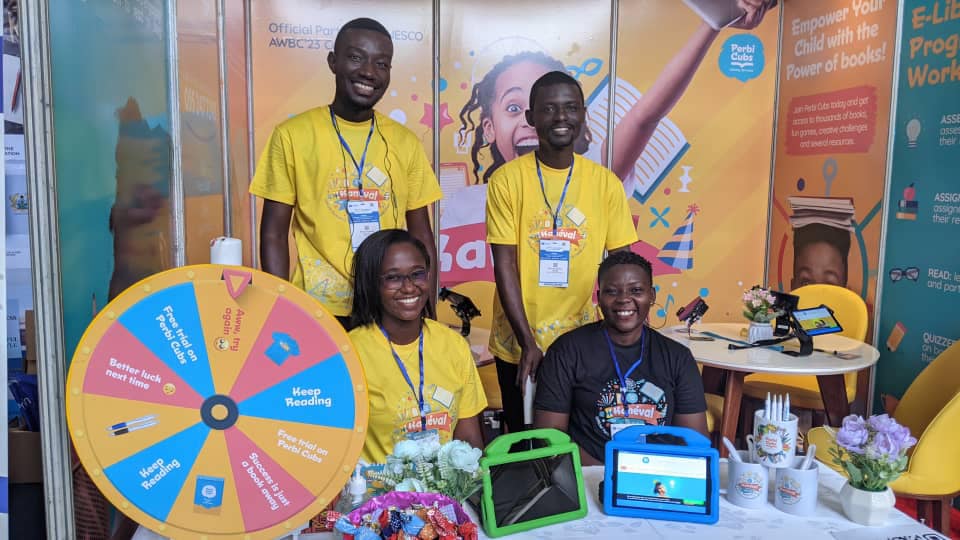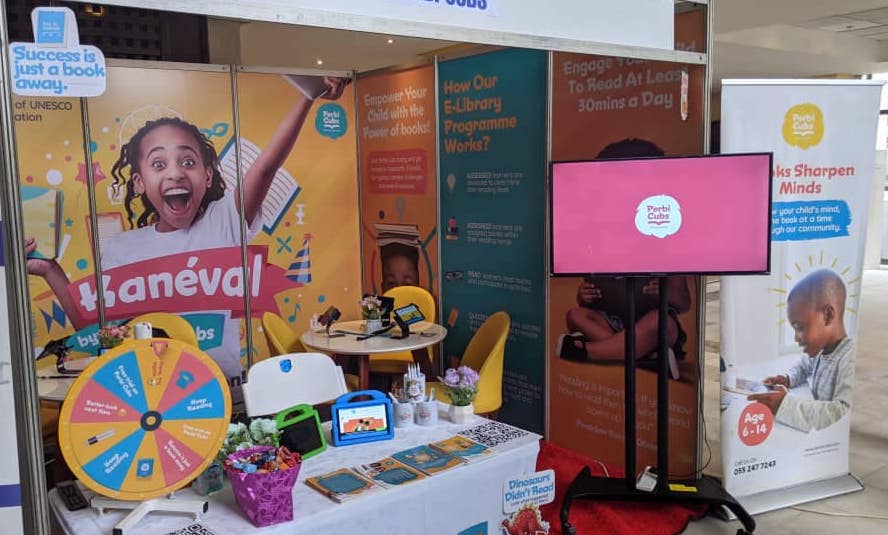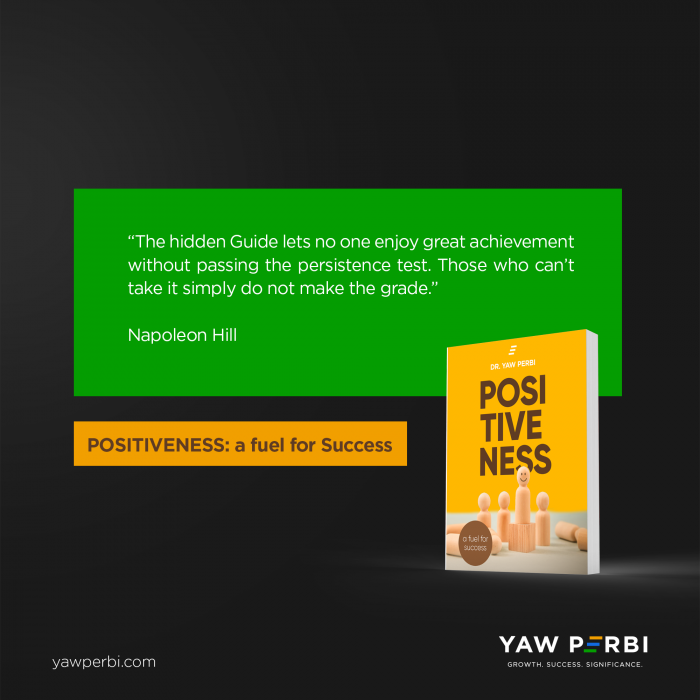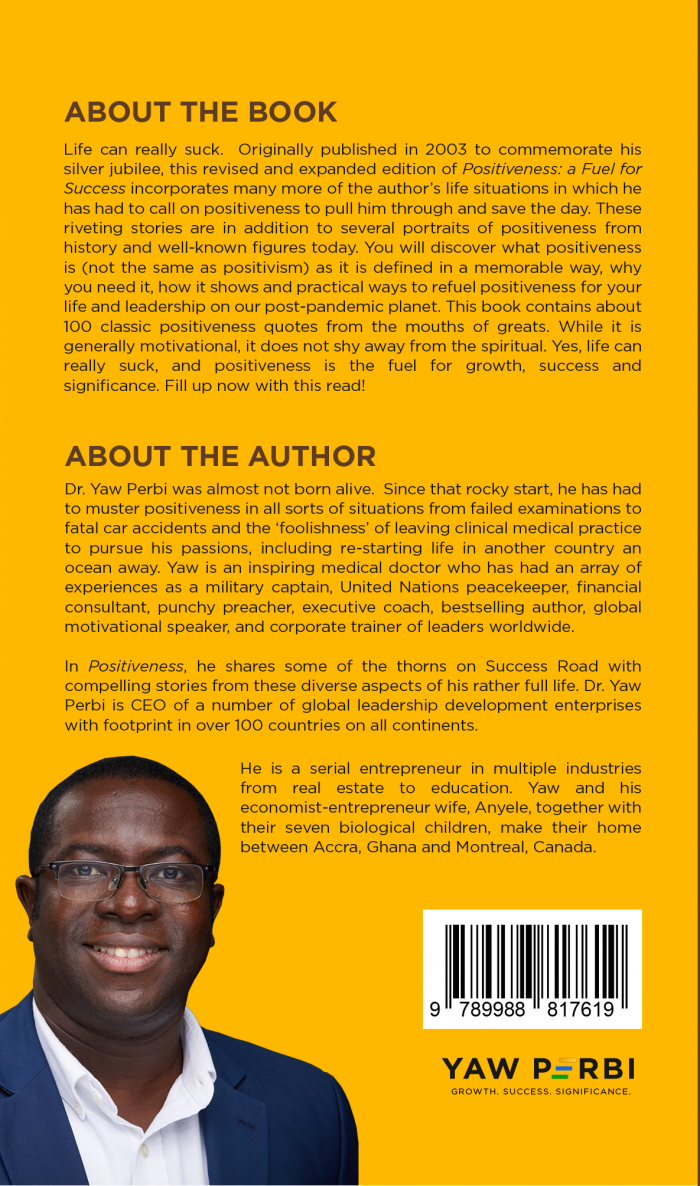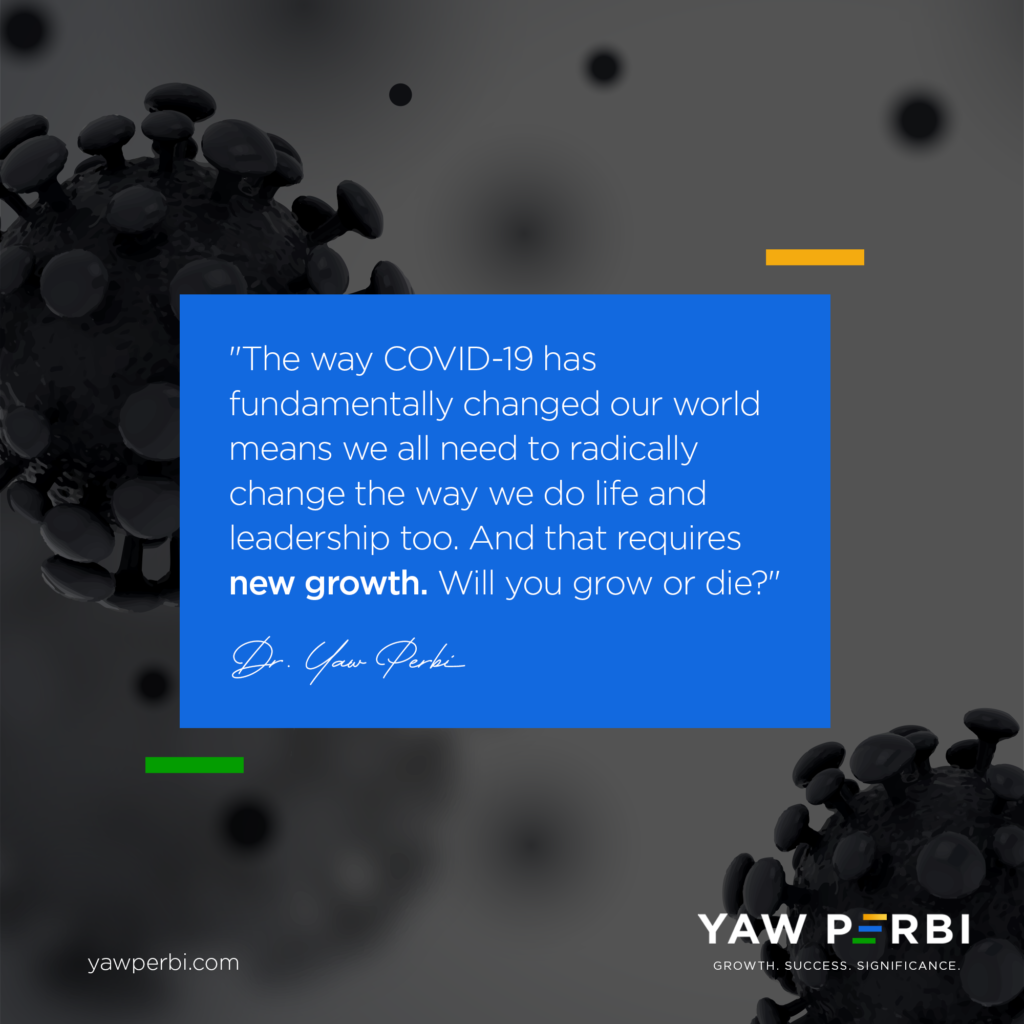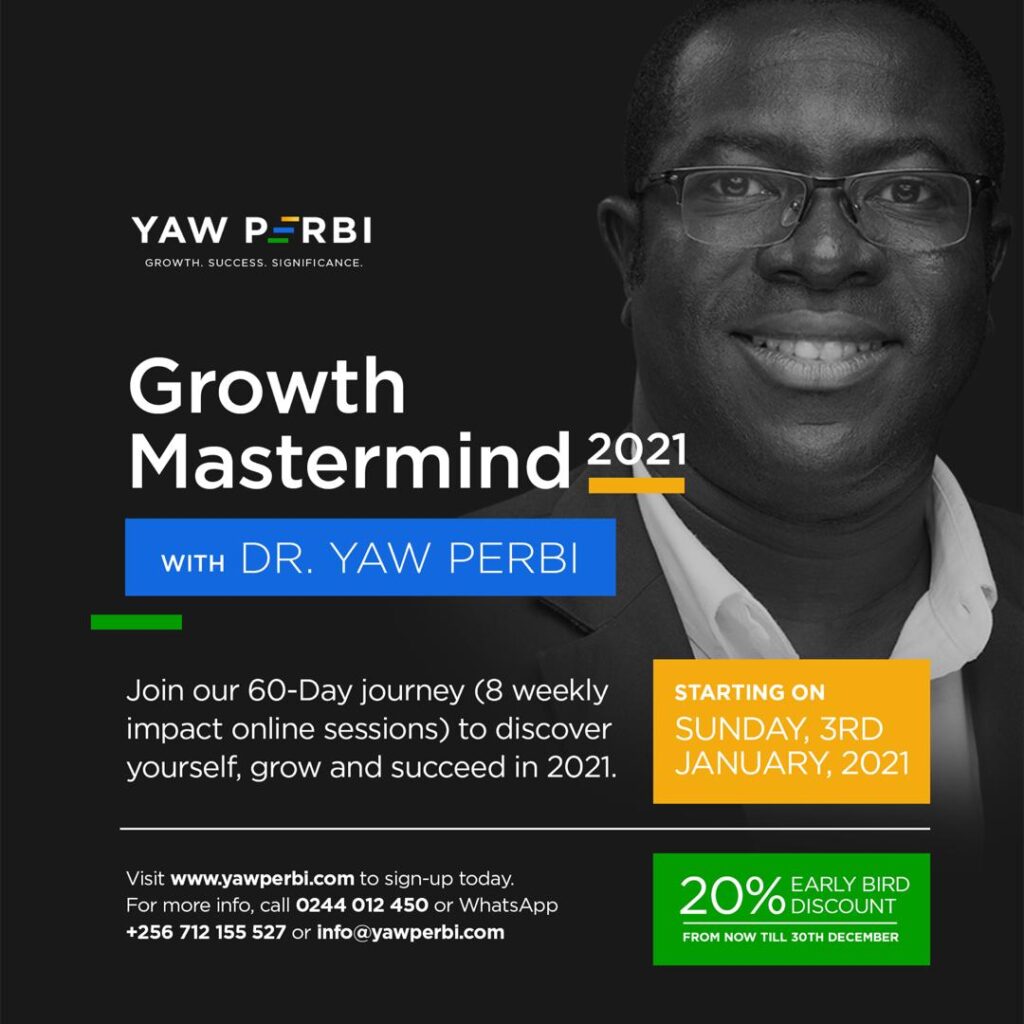
STRIVE MASIYIWA – Strife. Success. Significance.
The stirring story of an affluent, all-round African who began the burgeoning of Black British billionaires. From a southern African refugee status to a global tech giant stature, Strive Masiyiwa’s life story is loaded with life lessons.
INTRODUCTION
Strive Masiyiwa is a household name in the world of Information Communication Technology (ICT) on every continent of the world. Zimbabwe-born and London-based, the nearly-63-year-old African billionaire businessman and philanthropist worth 1.9 billion USD (2024)[1], a little ahead of Apple’s Tim Cook in the same industry,[2] has caught our eye at PELÉ for several reasons. Our interest has been in how well he straddles the worlds of leadership and entrepreneurship, politics and philanthropy, family and faith. Strive is the Founder and Executive Chairman of Econet Group, the international technology conglomerate comprising Econet Wireless Global and Cassava Technologies.
GROWTH
Early Years
Born to entrepreneurial parents on January 29, 1961 in then Rhodesia, later to become Zimbabwe post-independence, Strive Masiyiwa’s family left the country after the government of Prime Minister Ian Smith‘s Unilateral Declaration of Independence from the United Kingdom.[3] Their refugee family settled in a copper mines area in Zambia where Strive would attend primary school. By the age of 12, his parents could afford to invest in European education and sent him off to a private school in Edinburgh, Scotland as an international student.
Politics
In the wake of finishing high school in Scotland, in 1978, Master Masiyiwa returned to Africa to join the freedom fighters. However, “One of the senior officers told me,” he recalls, “’Look, we’re about to win anyway, and what we really need is people like you to help rebuild the country.'”[4] With that he returned to Britain to study engineering, and would later lead “a new African revolution–in telecommunications.”[5]
Strive would finally graduate from the University of Wales in 1983 with a degree in electrical engineering. After a stint in the computer industry in England he returned to Zimbabwe the next year hoping to aid the post universal franchise elections country recover from the Rhodesian Bush War.[6]
Entrepreneurship
When Masiyiwa returned home to Zimbabwe after a 17-year hiatus, he initially worked briefly as a telecoms engineer for the state-owned telephone company before quitting to start up his own electrical engineering business using his monthly salary savings and a Barclays bank loan.
Later he would grow large in his entrepreneurial expedition and diversify into telecoms, with the emergence of mobile cellular telephony, eventually establishing Econet Wireless after much strife with the Zimbabwean government which initially refused to give him a licence to operate. That was a five-year legal battle (1993-1998) which went all the way to the highest court of the land and reportedly took him to the brink of bankruptcy. Strive’s strife was against a crippling cocktail of corruption and cronyism. In the end, his victory was not for himself alone, for it led to the removal of the state monopoly in telecommunications, and is regarded as one of the key milestones in opening the African telecommunications sector to private capital.[7]
Dual Blessing of Southern and South Africa
In 2000 Masiyiwa left Zimbabwe with his family to go to South Africa for a season. “Part of the reason it would be unwise for him to return is almost certainly linked with a decision he took that same year to make a personal loan to the owners of Zimbabwe’s three independent newspapers, including the Daily News, which was later shut down by Mugabe’s regime.”[8] While this was his second refuge in his native southern African region—having been once a refugee in Zambia as a young lad—Masiyiwa maintains that the real reason he moved to South Africa was to realise his dream of creating a truly multinational African business.[9] Hear him: “This is the space we have been trying to fill, to pioneer the development of African companies that have a global outlook. South Africa was the only place where there was an outlook about building businesses that go to other countries.”[10]
SUCCESS
Continental Leadership
Strive Masiyiwa’s company’s first cell phone subscriber was connected to the new network in 1998,[11] the same year in which he listed Econet Wireless Zimbabwe on the local stock exchange as a gesture of thanks to reward the thousands of ordinary people who supported him during his long legal battles against the Zimbabwean government.[12]
Today, Econet Wireless Zimbabwe has gone on to become a major business that dominates the Zimbabwean economy. Fifteen years into operation, in 2013, the Zimbabwe Investment Authority (ZIA) awarded Econet Wireless Zimbabwe with a Lifetime Award in the ICT sector, in recognition of the investment the company had made into the country. The said investment included a $1.2 billion injection, certainly responsible for the business outcome of rapidly moving Zimbabwe from low penetration levels of below 15% in 2009 to one of the fastest growing telecoms markets in the world with a penetration rate of almost 100%.[13]
At the turn of the millennium, sub-Saharan Africa had just one phone line for every 70 people, in contrast to almost one per person in the U.S. and Europe.[14] In just six years, between 1996 and 2002, Africa jumped from 2 million to 35 million mobile connections.[15] Today, the number of smartphone subscriptions in sub-Saharan Africa is over 415 million and is expected to reach 689 million by 2028.[16] Strive has been part of the leadership that has made the continent leapfrog the ‘landlines’ stage in development, with Africa even leading the world today in cell phone innovations in fintech like mobile money (MPESA in Kenya and MoMo in Ghana). Talk of vision, at the start of Econet when Strive had proposed a joint venture and reached out to the national telecoms company, his former employers, the cataractic bosses were adamant and categorically stated that there was no call for mobile telephones in Zimbabwe.[17]
Global Impact
Econet Wireless International, Econet Global, Mascom Wireless Botswana, Econet Wireless Nigeria (now Airtel Nigeria), Econet Satellite Services, Lesotho Telecom, Econet Wireless Burundi, Rwanda Telecom, Econet Wireless South Africa, Solarway, and Transaction Processing Systems (TPS) are all key Strive Masiyiwa businesses established with partners. Mr. Masiyiwa’s operations and investments run across Africa and the United Kingdom, Europe, US, Latin America, and New Zealand, United Arab Emirates, and China.[18]
Strive Masiyiwa’s entrepreneurial and leadership success has had its financial payoffs, even on a personal level. For instance, he owns two adjacent apartments atop the 29-storey Eldorado Tower at 300 Central Park in New York City, bought for US$24.5 million in 2016.[19] On 7 July 2022, Masiyiwa became the first black billionaire to enter the Sunday Times Rich List with a net worth of £1.6 billion.[20]
As a brand that values integrity, we cannot help but reproduce one of our favourite Masiyiwa quotes on the issue: “Integrity is better capital than money. You can accumulate it just like money, and you can use it just like money, but it goes further, and is enduring.”[21] A related Masiyiwa quote is: “If we tackle corruption, no child would sleep hungry, there would be no injustice, every child would be in school. The most powerful force against corruption is one person saying “no”.” You may find these, along with eight other powerful quotes of his, in a brief Forbes article.
Family
If indeed “true success is when those who know you the best, love you the most” (John Maxwell) then Strive is successful on that count. Strive is married to a queen of philanthropy, Tsitsi, with whom he has six biological children: Elizabeth, Sarah, Vimbai, Moses (the only male), Joanna and Esther. Their oldest is now thirty-two. The family resides in London, England.
SIGNIFICANCE
At PELÉ, we are convinced that individual success must lead to societal significance. Well, the man once picked by Time magazine as one of its 15 “global influentials” has been mentioned in the same breadth as greats like Nelson Mandela and Kofi Annan, both of the African soil with global impact.
Philanthropy
Strive runs a non-profit organisation, Higherlife foundation, together with his wife, Tsitsi Masiyiwa. The Zimbabwean billionaire couple’s NGO empowers vulnerable children through education and creates opportunities for highly talented young people. They run one of the largest support programmes for feeding and educating orphans on the continent through this family foundation.[22] As part of the The Giving Pledge, a commitment to philanthropy by the world’s wealthiest individuals, it appears Masiyiwa “spends nearly as much time and money giving back as he does growing Econet Wireless.”[23]
As a down-to-earth man of the people for the people, Masiyiwa still maintains a public Facebook page through which he primarily mentors budding African entrepreneurs and all who have ears to hear what he has to say about success in life, leadership, integrity, family, faith and entrepreneurship. This page currently has 5.7 million followers.
Boards
Masiyiwa’s international appointments and board memberships over the years, both for profit and non-profit, include: Unilever (board member), Netflix (board member), Bill & Melinda Gates Foundation (trustee),[24] the National Geographic Society (trustee), Bank of America (Global Advisory Council), UN Commission on Adaptation (former Commissioner), Generation Africa (co-founder), Pathways for Prosperity Commission on Technology and Inclusive Development (co-chair), The Rockefeller Foundation (former board member),[25] and the US Council on Foreign Relations (former Global Advisory Board 2012-2023).
Mr. Strive Masiyiwa has also served the Asia Society (former board member), Stanford University (Global Advisory Board), the Africa Progress Panel, Alliance for a Green Revolution in Africa (chair, now Chair Emeritus), The Micronutrient Initiative of Canada (former board member), Grow Africa, the African Union‘s Ebola Fund (co-founder), Morehouse College (former Trustee), the African Academy of Sciences (Honorary Fellow) and the Pan African Strategic Institute. A couple of years ago, Strive was involved in helping to organise the Global Africa Business Initiative launched in New York in 2022. He is the only African member of the United States Holocaust Memorial Museum‘s Committee on Conscience. Masiyiwa has also served on a couple of UN Advisory Panels.
Faith
Masiyiwa is a practising Christian.[26] It was during the five-year legal strife with his home government that when his wife invited him to church he would realise that “I did not know Him [Jesus Christ]; I only knew of Him.” That moment changed everything for Strive. He borrowed a second-hand Bible, and read the entire book in two weeks, committing his life (and business) fully to Christ.[27] “Christianity is a value system that calls on me to be compassionate, it calls on me to help the weak,” he says. “I generate a lot of money for me and my shareholders and people who have been associated with me, but that cannot be an end in itself.”[28]
Strive is the co-founder of the Capernaum Trust, a Christian charity that sponsors the education of over 28,000 Zimbabwean orphans, and co-founded with Sir Richard Branson the environmental group the Carbon War Room. As noted above Mr. Masiyiwa sits on countless boards, from Grow Africa to organisations leading the charge against evils like HIV/AIDS, Ebola and genocide. He joined forces with Africa’s richest man, Aliko Dangote, to tackle the 2014 Ebola epidemic in West Africa, raising $35 million to stem the tide and bolster the economies of affected countries.[29]
CONCLUSION
Strive Masiyiwa has striven and succeeded, by all standards, be it in entrepreneurship, leadership, politics, philanthropy, family or faith. Britain’s first Black billionaire is a blessed Prince of Africa, for just like the Semitic patriarch who wrestled with a mysterious man until daybreak when he was eventually blessed by the divine, in prophetically naming him ‘Strive’ his Zimbabwean parents must have had a hunch that he too will strive with God and with humans, and win.[30] He has. Hands down.
[1] https://www.forbes.com/billionaires/
[2] https://www.forbes.com/billionaires/
[3] Out of Zimbabwe, a telecoms boss means serious business in Africa”. The Guardian. 30 July 2009. Retrieved January 11, 2023.
[4] Robinson, Simon (2 December 2002). “Strive Masiyiwa: Founder of Econet Wireless”. Time.
[5] Ibid.
[6] Arlidge, John. “How Strive Masiyiwa became Britain’s first black billionaire”. Retrieved January 11, 2023.
[7] Out of Zimbabwe, a telecoms boss means serious business in Africa”. The Guardian. 30 July 2009. Retrieved January 11, 2023.
[8] Out of Zimbabwe, a telecoms boss means serious business in Africa”. The Guardian. 30 July 2009. Retrieved January 11, 2023.
[9] Ibid.
[10] Ibid.
[11] Robinson, Simon (2 December 2002). “Strive Masiyiwa: Founder of Econet Wireless”. Time.
[12] https://nehandaradio.com/2014/06/16/story-masiyiwa-story-raised-money-part-3/ (from Strive’s own blog). Retrieved January 11, 2023.
[13] https://www.techzim.co.zw/2013/11/investment-zimbabwe-earns-econet-wireless-zia-lifetime-award/
[14] Robinson, Simon (2 December 2002). “Strive Masiyiwa: Founder of Econet Wireless”. Time.
[15] Ibid.
[16] Taylor, Petroc (18 July, 2023). Smartphone subscriptions in Sub-Saharan Africa 2011-2028. Statista.
[17] The Economist. (8 October, 1998). Judgment Day. This article appeared in the Business section of the print edition under the same headline. Last retrieved January 15, 2024.
[18] Leach, Anna (18 August 2014). “Zimbabwe’s Econet Wireless and the making of Africa’s first cashless society”. The Guardian.
[19] Ojekunle, Aderemi (1 April 2019). “A peek into the life and business empire of Strive Masiyiwa, Zimbabwe’s first billionaire”. Pulse Nigeria. Retrieved January 15, 2024.
[20] Watts, Robert. “Strive Masiyiwa: the first black billionaire to make the Rich List. This is his story”. The Times. ISSN 0140-0460. Retrieved January 15, 2024.
[21] Nsehe, Mfonobong. (Jul 6, 2014). “10 Inspirational Quotes From Zimbabwe’s Richest Man, Strive Masiyiwa.” Forbes. Last retrieved January 16, 2024.
[22] Ojekunle, Aderemi. (4 January, 2019). A peek into the life and business empire of Strive Masiyiwa, Zimbabwe’s first billionaire. Pulse Nigeria.
[23] https://www.arrowleadership.org/blog/general-leadership/the-faith-of-strive-masiyiwa/ Last retrieved January 15, 2024
[24] Kulish, Nicholas (26 January 2022). “Three New Faces to Help Steer the Gates Foundation”. The New York Times. Retrieved January 15, 2024.
[25] “Rockefeller Foundation Board of Trustees-Strive-Masiyiwa”. Retrieved January 15, 2024.
[26] https://www.arrowleadership.org/blog/general-leadership/the-faith-of-strive-masiyiwa/ Last retrieved January 15, 2024
[27] Ibid
[28] https://www.theguardian.com/technology/2009/jul/30/strive-masiwiya-zimbabwe-telecoms
[29] Ojekunle, Aderemi. (4 January, 2019). A peek into the life and business empire of Strive Masiyiwa, Zimbabwe’s first billionaire. Pulse Nigeria.
[30] The Holy Bible. Genesis 32:27-28
50 Inspiring Living Leaders
This 50 Inspiring Living Leaders series highlights current influencers who are succeeding in leadership, integrity, family or entrepreneurship in whatever field and exhibit most, if not all, of our values of PELÉ. We value people, growth, particularity, excellence, success, authenticity and significance. These stories are largely written in terms of growth, success and significance in leadership, integrity, family and entrepreneurship. While we do our best to receive personal references about each leader, most of our research and writing is based on literature review of publicly-available information. As authorities in leadership, we are fully aware that there is no such thing as a perfect leader, and leaders may have their flaws, but we choose to celebrate these inspiring living leaders for their achievements outlined in our series. Having said that, should you happen to have any incontrovertible evidence that any of our featured leaders does not fit our bill of an authentic leader, please write to us at info@perbiexecutive.com. Our vision at PELÉ is a flourishing global ecosystem of authentic leaders characterised by healthy growth, holistic success and lasting significance.
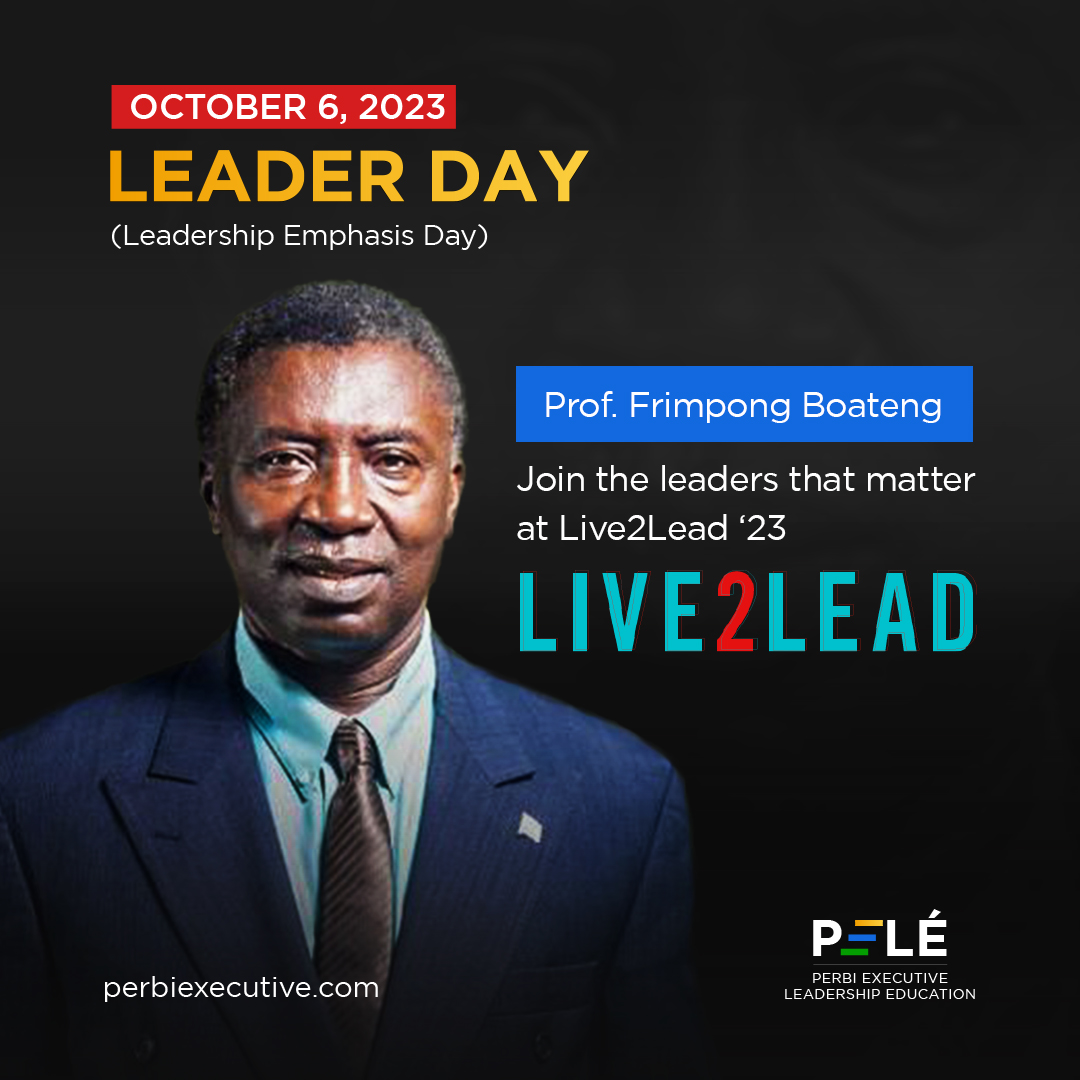
The Father of Open Heart Surgery Opens His Heart at Live2Lead 2023
Professor Kwabena Frimpong-Boateng is an astute German-trained Ghanaian cardiothoracic surgeon and founder of the National Cardiothoracic Centre whose recent foray into Ghanaian politics nearly marred his otherwise stellar legacy. He is also the Founder and President of the Ghana Heart Foundation, erstwhile Chief Executive Officer of Ghana’s premier teaching hospital (the Korle Bu Teaching Hospital, in Accra) and immediate past Minister of Environment, Science, Technology and Innovation for the Republic of Ghana (2017-2021). He has been a Fellow of the Ghana Academy of Arts and Sciences since December 2002.
A STRING OF FIRSTS
The best leaders lead from the power of their life stories, positive and otherwise. Even before Kwabena Frimpong-Boateng would be born, his father Kofi Frimpong died from chest/heart injuries sustained from a road traffic accident. Kwabena was barely four months from birth. It comes as no surprise then that although his first love was engineering, due to his affinity for physics and mathematics while he attended Sekondi College in the Western Region of Ghana, he later would later go the doctor route at university. As if destiny was calling, after the University of Ghana Medical School and housemanship, he was offered a scholarship to study general, cardiothoracic and vascular surgery in Germany. As Frimpong-Boateng figured he could help people with heart situations like his late father, he took the opportunity to sharpen his craft and deepen his calling at the Hannover Medical University in Hannover.
So forty years ago, in 1983, Kwabena Frimpong-Boateng and his team of professors did their first heart transplant on a human being and then performed his first transplant as the lead surgeon in October 1985. This made him the first Black doctor to perform a heart transplant, earning him the nickname the “Black Pearl.”
At the time, he was recognized worldwide for this feat and as if that was not enough, in November 1988, three years later, he struck another first: the first heart-lung transplantation in Hannover. After finishing his post-graduate studies, despite being in very high demand in Europe, he chose to return to the land of his birth to practise as Ghana’s first locally based cardiothoracic surgeon. Frimpong-Boateng performed the first open-heart surgery in Ghana using the heart-lung-machine.
Even away from the hospital, as a farmer Frimpong-Boateng established the first ostrich farm in Ghana, in the village of Dedukope, in the Volta Region of Ghana.
SPEAKING OF LEGACY
Translating his personal success into societal significance, in 1989 he set up the National Cardiothoracic Centre at the Korle Bu Teaching Hospital and was commissioned in 1992. There were no cardiothoracic surgery facilities in the country at the time and this was really avant garde for a country still struggling with primary health care issues such as mosquito-bourne Malaria and childhood vaccinations. Today, people head to the centre from all over the continent for cardiothoracic attention and is now recognised by the West African College of Surgeons to train heart surgeons, cardiologists, cardiac anaesthetists, operating room nurses, intensive care nurses, cardiac technicians, and other cardiothoracic technicians. As a practicing Christian, he has said that his work on the foundation of the National Cardiothoracic Centre was God’s purpose in his life.
One of the greatest way to pass on legacy is by teaching others. Frimpong-Boateng joined the University of Ghana Medical School as a lecturer in 2000 and was promoted associate professor the same year. He was made a full professor in 2002. He also served as the head of the Department of Surgery at the University of Ghana Medical School, prior to his appointment as the Chief Executive of the Korle-Bu Teaching Hospital in 2002. The Ghana Heart Foundation, which he also founded, raises funds to pay for heart surgery for some indigent Ghanaians who cannot afford the cost of such specialized surgery.
Again, he has done well, in terms of passing on legacy, by authoring a couple of biographical books, Deep Down my Heart: A History of Cardiothoracic Surgery in Ghana and Taming the Monster, a treatise on managing Ghana’s behemothic premier teaching hospital.
In March 2006, Prof. Frimpong-Boateng unsuccessfully sought nomination as the candidate of the New Patriotic Party (NPP) for the December 2008 national presidential elections. Regardless of his results, he declared he was still concerned with political issues in relation to education and health problems and would later become a Minister of State. Yet he regrets that political corruption in Ghana is too much and opines that politicians are not taking social priorities into account, especially the need for technology. His foray into the deep and often turbulent waters of politics, especially as chairman of the inter-ministerial committee on illegal mining in the country, nearly marred his enviable legacy of pioneering and impactful lifework. In a recent interview with the Africa Watch magazine, he boldly declared, “Impunity rules in Ghana.”
The erudite professor has had several local and international awards over the last four decades, including two honorary doctorates. Frimpong-Boateng and his wife, Agnes, have five children, some of whom are doctors also.
PROF. FRIMPONG-BOATENG AT JOHN MAXWELL’S LIVE2LEAD ANNUAL CONFERENCE 2023
The good professor speaks at this year’s annual live2lead Ghana, a brainchild of Dr. John C. Maxwell. As Perbi Executive Leadership Education (PELE), we have been privileged to host Live2Lead on both sides of the Atlantic, in Montreal, Canada as well as in Accra, Ghana. We are absolutely convinced that leadership is taught; not just caught. Join John and the stellar faculty he’s put together for this year’s Live2Lead conference and up your leadership game.
This year, together with our partners in Ghana, we’ve chosen the theme, “Leading for Legacy.” Speaking of legacy, in the said interview with the Africa Watch magazine, Prof. Frimpong-Boateng said, “Life is not all about fame and money, but more importantly, what one can do to help others.” He also recently wrote An Open Letter to Anybody Who Wants to be President of Ghana in 2025. Among other things, words that bordered along legacy were the following: “…the success of true leadership is measured by what extent the people can be mobilized to lead independent lives: to feed, shelter, clothe, heal, and defend themselves, and also produce tools, implements, spare parts and machines they require for daily living, so that if for one reason or the other ships and airplanes are unable to access the country the citizens can stand on their own and survive.” Come and find out how to truly lead successfully, in-person at the Ecobank Ghana Headquarters in Accra, or online, wherever in the world you might be!
October 6 is Leader Day this year. Register now through this link. Impress upon your organization to join the Leadership Emphasis Day/Leader Day movement that will transform society by becoming a Patron of Live2Lead. A Patron company or individual is one that sends at least 10 leaders to Live2Lead. Together we can change our world for the better! Yes we can!
Register HERE, NOW.
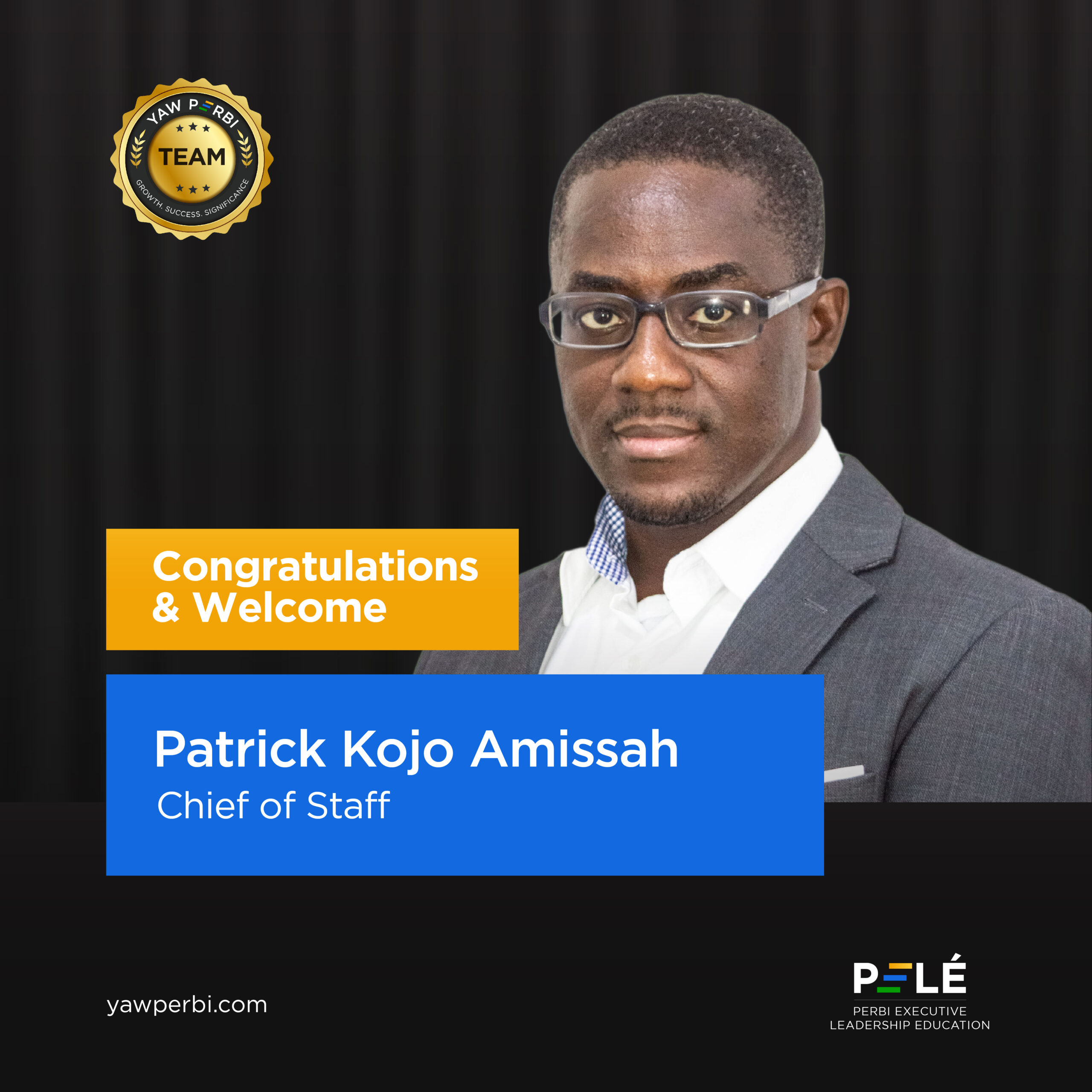
Perbi Executive Leadership Education (PELÉ) Gets New Chief of Staff: Introducing Patrick Kojo Amissah.
Perbi Executive Leadership Education (PELÉ) and allied Perbi establishments heartily welcome Mr. Patrick Kojo Amissah as our new Chief of Staff. Kojo Amissah is a versatile professional with experience in organisational leadership, team and operations management. He believes in striving for excellence and critically analysing problems with the goal of coming up with practicable, innovative solutions. He has worked in the educational, publishing and financial sectors.
Kojo’s previous work experience includes co-managing a start-up (Catalyst Learning Limited) and growing it into a sustainable firm. His responsibilities included structuring and establishing different roles and tasks, recruiting and training staff, establishing systems, managing finances, and planning and executing projects. For over three years he led in the development, printing and distribution of over five million copies of textbooks and workbooks to various schools across Ghana. He managed communications and relations with foreign printing firms including negotiating prices and planning the delivery of printed books.
We are convinced that the skills and knowledge gained from these experiences will enable him to quickly adapt to the demands of the Chief of Staff role at PELÉ and to exceptionally perform the outlined responsibilities. Mr. Amissah possesses good leadership and team management skills which he honed while serving as Team Leader, Curriculum Development and as Chief Operations Officer. Watch out for PELÉ’s online leadership courses to be launched by mid 2023.
Mr. Amissah developed important team building and conflict management strategies as he directly and indirectly managed over thirty individuals performing different roles. He also possesses good negotiation skills and valuable stakeholder management experience. At PELÉ, we believe these are important transferable skills that will aid his interactions with staff of Perbi Executive Leadership Education and affiliated organisations like Perbi Cubs, Kwiverr, The HuD Group, Send Africa, Adeshe Real Estate, ISMCanada, PAIS, Africa to the Rest, BCA Leadership, the Lausanne Movement etc. Kojo takes the baton from Ashesi cum University of Warwick alumna Araba Andoh who laid pioneering tracks for the role.
According to Kojo, “I am highly motivated to serve in the role because it provides the opportunity for me to put my unique mix of experience in leadership, operations management and publishing to use in the worthy cause of growing executives to make significant impact in society. I also believe that working directly with an accomplished leader and entrepreneur like Dr. Yaw Perbi is an unmissable opportunity to grow professionally.” Among Kojo’s first tasks will be helping to host the incoming BCA Leadership Made in Africa Leadership Conference, launching PELÉ’s avant-garde DeepLEAD online leadership course and providing operational support for both The HuD Group’s 20th anniversary activities and Kanéval by PerbiCubs/UNESCO Accra World Book Capital. In commemoration of the latter, Dr. Yaw Perbi seeks to (re)publish all his two dozen books.
We welcome Mr. Kojo Amissah at this inflexion point where YAW PERBI is transitioning to PELÉ (Perbi Executive Leadership Education) to maximize team potentials beyond the availability and capability of Dr. Yaw Perbi as an individual. PELÉ by YAW PERBI is an Executive Education firm that offers authentic and customized relationships and resources to C-Level executives to grow personally, succeed professionally and become significant societally. PELÉ’s vision is to see a flourishing global ecosystem of authentic leaders characterized by growth, success and significance.
Kojo wields a Bachelor’s degree from the University of Ghana and an MBA from Coventry University. He is a practising catholic. Akwaaba, Kojo. Bienvenue, Monsieur Amissah. Here’s to your own growth, success and significance. Together, let’s carpe diem and make a dent in the universe!

Confluence for Influence: Kanéval by Perbi Cubs Leverages UNESCO’s Accra World Book Capital 2023.
Exciting news! Perbi Cubs Library Services is teaming up with the United Nations Educational, Scientific and Cultural Organization (UNESCO) and the Ghana Book Development Council, among others, to celebrate Accra World Book Capital (AWBC ’23) as official partners. Accra, the capital city of Ghana, in West Africa, is the 23rd city in the world, and only the fourth in Africa, to have the honour of this title which UNESCO initiated in 2001 to promote literacy globally. This is akin to a literacy World Cup title, only it is bestowed annually.
The World Book Capital is an initiative of UNESCO which recognizes cities for promoting books and fostering reading for a year, starting on April 23, World Book and Copyright Day. UNESCO adopted the 31 C/Resolution 29, in 2001, establishing the World Book Capital (WBC) programme. Cities designated as UNESCO World Book Capital pledge to carry out activities with the aim of encouraging a culture of reading and diffusing the values of literacy, lifelong learning, copyright, and freedom of expression in all ages and population groups, both within and beyond national borders. The first city to be awarded was Spain in 2001 and Accra’s turn is sandwiched between Guadalajara, Mexico (2022) and Strasbourg, France (2024).
The UNESCO World Book Capital Advisory Committee, which evaluates bids to win the title, comprises representatives of the International Publishers Association (IPA), the International Federation of Library Associations (IFLA), the International Authors Forum (IAF) and UNESCO. Past capitals include Madrid (2001), Alexandria (2002), New Delhi (2003), Anvers (2004), Montreal (2005), Turin (2006), Bogota (2007), Amsterdam (2008), Beirut (2009), Ljubljana (2010), Buenos Aires (2011), Erevan (2012), Bangkok (2013), Port Harcourt (2014), Incheon (2015), Wroclaw (2016), Conakry (2017), Athens (2018), Sharjah, (2019), Kuala Lumpur (2020) and Tbilisi (2021).
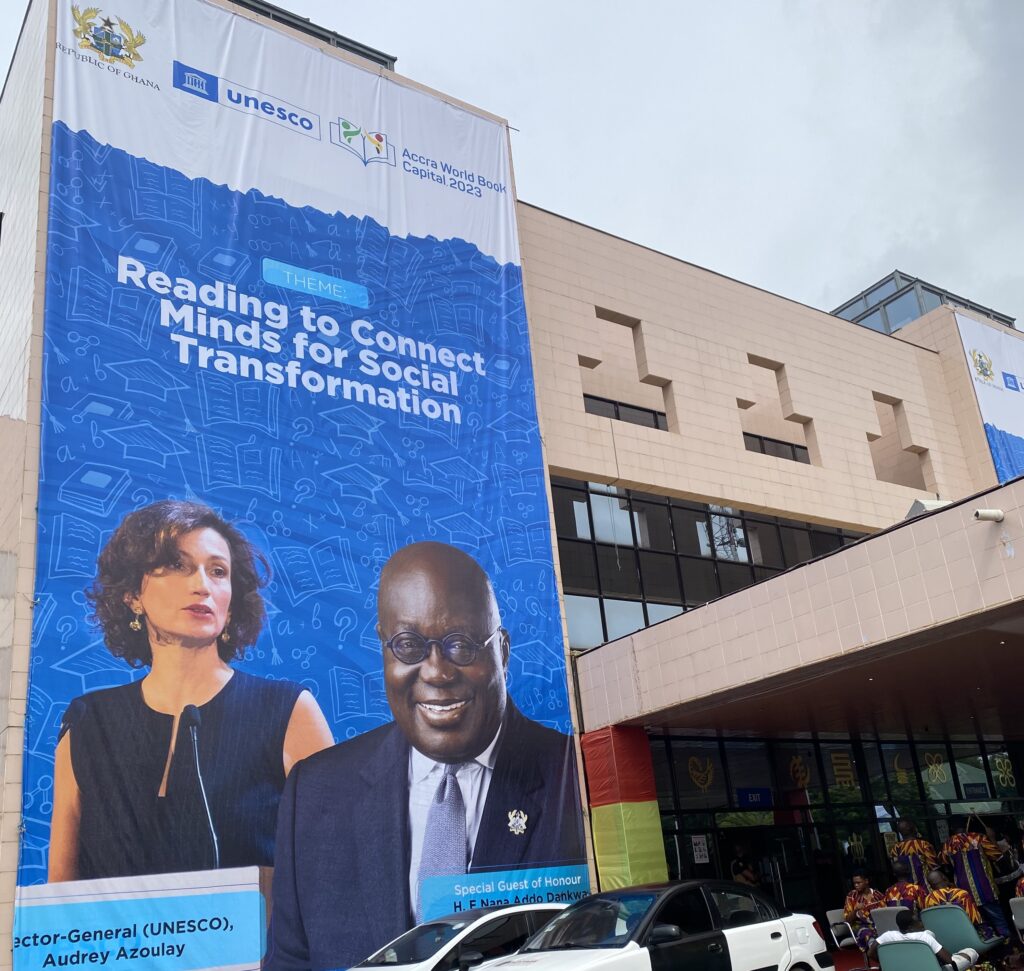
The grand opening ceremony of Accra World Book Capital at the Accra International Centre by the President of the Republic of Ghana
THE GHANA JOURNEY
Accra’s first attempt to win the 2019 World Book Capital title, after the idea was mooted in 2016 and working towards that, failed. Accra relaunched the bid in April 2021 and won it. The executive board of UNESCO, at its 215th session in Paris, France, on September 22, 2021, named Accra the World Book Capital 2023, following evaluation by the World Book Capital Advisory Committee. This was no mean achievement for the ten-member bidding team representing the Accra Metropolitan Assembly, Ghana Commission for UNESCO, Ghana Library Association, Ghana Publishers Association, Complementary Education Agency (formerly Non-Formal Education Division), Ghana Association of Writers, and the Ministry of Foreign Affairs and Regional Integration and chaired by Mrs Ernesticia Lartey Asuinura, the Executive Director of the Ghana Book Development Council (GBDC). Several internal staff of GBDC were behind this successful bid and must be applauded.
According to UNESCO, “the city of Accra was selected for its strong focus on young people and their potential to contribute to the culture and wealth of Ghana. Accra’s proposed programme seeks to use the power of books to engage these young people, as an effective way of skilling up the next generation.” Earlier this year, on April 11, the Minister of Education of Ghana, Dr. Yaw Adutwum, held a press launch of AWBC’23 at which Perbi Cubs was represented by the Founder and CEO, Mrs. Anyele Perbi. He explained that Accra was selected ahead of other cities because the Education Ministry’s programmatic focus was on young people and their ability to contribute to the culture and wealth of Ghana through the power of reading. “Research shows that reading improves the learning outcomes of students in schools,’ said the Minister. “That’s why in certain schools around the world, they’ve implemented and employed the ‘Drop Everything And Read’ – ‘DEAR’. So if it’s 15 minutes, 20 minutes a day, children are made to stop everything and read,” he illustrated.
Dr. Yaw Perbi, Global CEO of The HuD Group and Co-Founder of Perbi Cubs, and Mrs. Anyele Perbi , Founder and CEO of Perbi Cubs, were invited and did attend the grand opening of AWBC ’23 by the President of the Republic of Ghana, Nana Addo Dankwa Akufo-Addo, and the Director-General of UNESCO, Madam Audrey Azoulay Ayoub, at the Accra International Conference Centre. The theme for the occasion was ‘Reading to connect minds for Social Transformation’. It was encouraging interacting with school children as well as top academics at the Perbi Cubs booth, including members of the Ghana Academy of Arts and Sciences. Visiting the exhibition booths of other players in the literacy space was also invigorating but nothing beat the joy of seeing the attending school children flock to the Perbi Cubs stand to sample for a few minutes the thousands of books on their online platform.
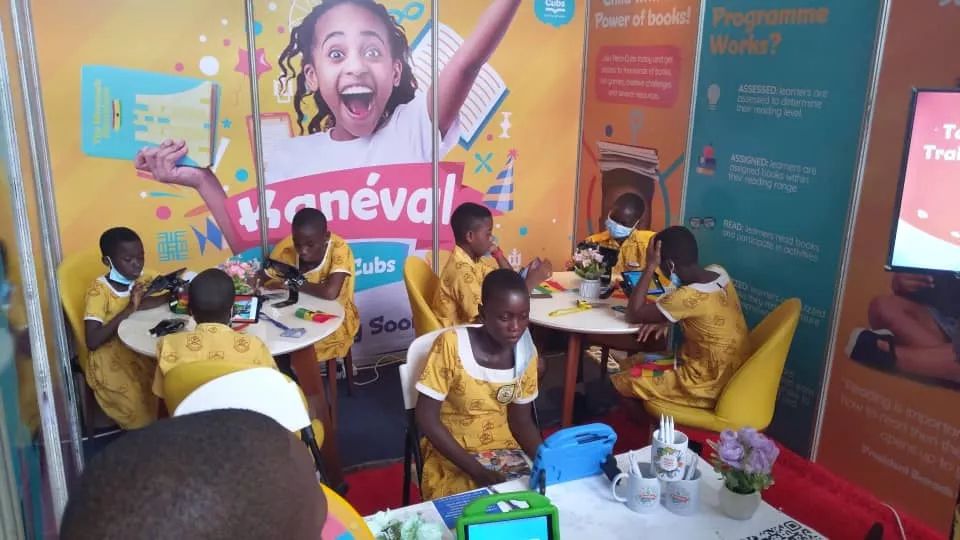
Several groups of school children practicalized the whole point of AWBC by doing actual reading at the launch
Under the theme ‘Reading to connect minds for social transformation’ the programmes planned for the title year will focus on particularly the youth and vulnerable groups in Accra (and Ghana at large) such as children, underemployed women, head-porters (kayayei) and persons living with disability, to equip them with literacy and employable skills, while promoting the rich Ghanaian cultural heritage and the book industry in Ghana.
THE PERBI JOURNEY
Both Yaw and Anyele Perbi (née Ampa-Sowa) come from homes full of books. In fact, they got to know each other as children of professors at the University of Ghana campus. Anyele’s dad was an Economics lecturer and Yaw’s mum, a history lecturer. In their growing up years Yaw’s own dad, being a long-time member of the board of Challenge Bookshop, would receive loads of books every year, feeding their home library fat.
Tracing the history of books even further, Yaw’s maternal grandfather was not only an author and professor of African Studies and Ethnomusicology at the same university, but also together with writer and educator Dr. Efua Sutherland organized the first international book fair in Ghana in the early 1970s and proceeded to come together to found Afram Publications a couple of years later, incorporating it in February 1973. Emeritus Professor J.H. Kwabena Nketia was his name.
The Perbi household buzzed with books and moments like when the floating bookshops, the MV Doulos or Logos ships, would berth at the Tema Harbour were fun galore. Meanwhile, Yaw did not like reading as much as Anyele in their early years on the Legon campus. Anyele LOVED reading to the point that the rate of buying books for her and her two brothers was threatening to bankrupt her parents. When she was missing from the house you could be sure she was immersed in a book somewhere!
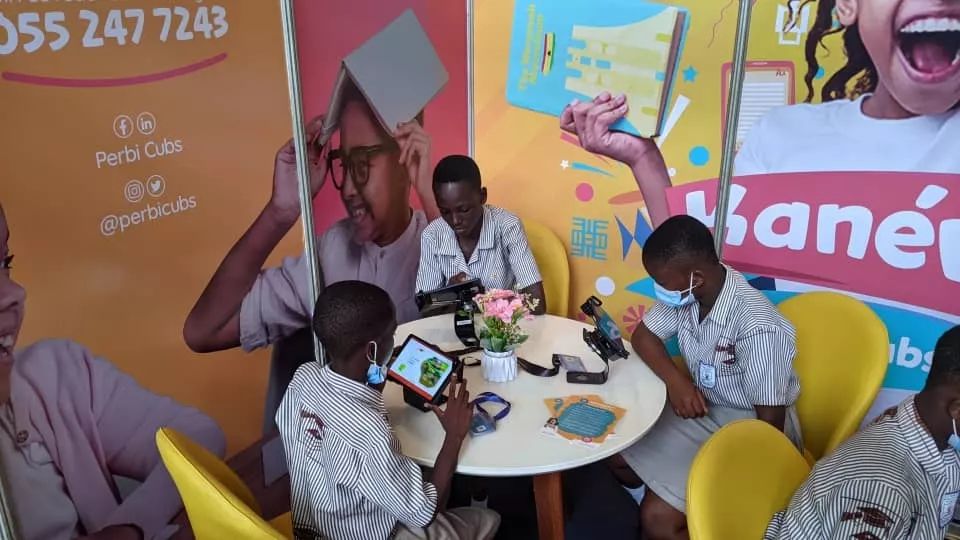
At the intersection of age old reading and new technologies stands Perbi Cubs’ online digital reading platform and offerings
Two jerking statements changed Yaw’s attitude towards books. The first was, “If you want to hide something from a Black people, put it in the book.” You may read the full story here. Fascinatingly, by the age of twenty-three, Yaw would write and publish his first book, What Every Fresher Should Know about University, and as an internationally-recognized author of some twenty books and several book chapters, journal articles etc. now, as they say, the rest is history. Today, one of his punchy books called Read! is subtitled: “You are ‘illiterate’ if you can read but don’t.” Dr. Perbi’s 2015 Thinking Outside the Window was even an Amazon bestseller in its category. His latest book, co-authored with a Kenyan and published in March 2023, is entitled Africa to the Rest. In it, Yaw stresses the need for Africans not only to read but also to write. “Until the lion learns to write,” he reminds us, quoting an old African wise saying, “every tale of the hunt will glorify the hunter.”
When Yaw founded The HuD Group in 2003, one of its first divisions was a library called The Mine (it still runs at the Staff Village of the University of Ghana). So for at least two decades now, Dr. Perbi has been a fierce reading campaigner. And now in tandem with the erudite Anyele, he likes to say “my wife and I have stepped up by stepping down.” What he means by that is, they’ve enhanced their reading campaign (stepped up) but decided to go further down to the age where humans are most pliable: childhood (stepping down). And they began with their our own seven children in the French city of Montreal, Canada which happens to have been the UNESCO World Book Capital in 2005, four years before they would dwell there as a family for the next dozen years. Their own children’s love for reading, the generous 40 books per person supply of the Pierrefonds municipal library across the street from their West Island home and an imminent eight-month visit to Ghana that threatened to stifle this Perbi reading culture combined to birth the Perbi Cubs Library Services. You may find the story and philosophy behind Perbi Cubs here.
AND NOW, KANÉVAL
According to Perbi Cubs CEO, “We are excited to inform you that Perbi Cubs, in partnership with UNESCO Accra World Book Capital 2023, will be organizing a fantastic year-long program. Watch out for Kanéval as it moves round throughout the year, to your school or community. Stay tuned on the various Perbi Cubs social media handles like Facebook, Twitter, LinkedIn and Instagram for more updates.” Kanéval by Perbi Cubs, a season of fun, inspiration, and BOOKS, is launching in Accra on May 11, 2023.
As long as reading remains a chore, we’ll have a problem promoting it. But who doesn’t love a good festival, a carnival? What if we could think outside the box and bring together the idea of a traveling amusement show with merrymaking sideshows, rides, etc. with reading? What if face-painting or getting on a swing was a reward for reading a book? These are some of the disruptive ideas that incubated and eventually hatched Kanéval. The idea of Perbi Cubs in general and KANÉVAL in particular, is to bring FUN to reading while strongly brandishing the connection between reading and success in life.
In the spirit of innovation and creativity, Perbi Cubs values, the coined word Kanéval was inspired by the word for read in Ga, the language of the Accra people, Kané. So combining ‘Kané’ with the English word ‘carnival,’ here we are! There will be lots of fun, reading and other educational activities. Perbi Cubs is grateful to several Ghanaian influencers like Nana Aba Anamoah (media personality and General Manager of GHOne TV and Starr FM), Bernard Avle (Citi Breakfast Show host and General Manager of Citi FM), Kafui Dei (author, speaker and GTV Breakfast host), Portia Gabor (TV3 hostess and Ghana Journalist Association’s reigning Journalist of the Year), Gwen Addo (entrepreneur, author and CEO, The Hair Senta), Giovani Caleb (media personality, radio and TV), Gifty Anti (author, media personality, celebrated journalist) and others who are synergizing with them to take the culture of reading to the next level to transform the fortunes of Ghana and Africa.
Perbi Cubs’ Kanéval is scheduled to take off on 11th May, 2023 at Alpha Beta Education Centres and then to all their partner schools and other communities, particularly deprived ones badly needing a literacy intervention. Kanéval is not just for our Cubs but all our stakeholders including you. There are many activities you can join in with exciting prizes. Kanéval awaits you for a Kanévalistic experience. Kanéval – Reading is fun!!! The amazing part is that in collaboration with various partners, Perbi Cubs is offering huge discounts on their subscriptions so that every Cub in their partner schools can read this year!
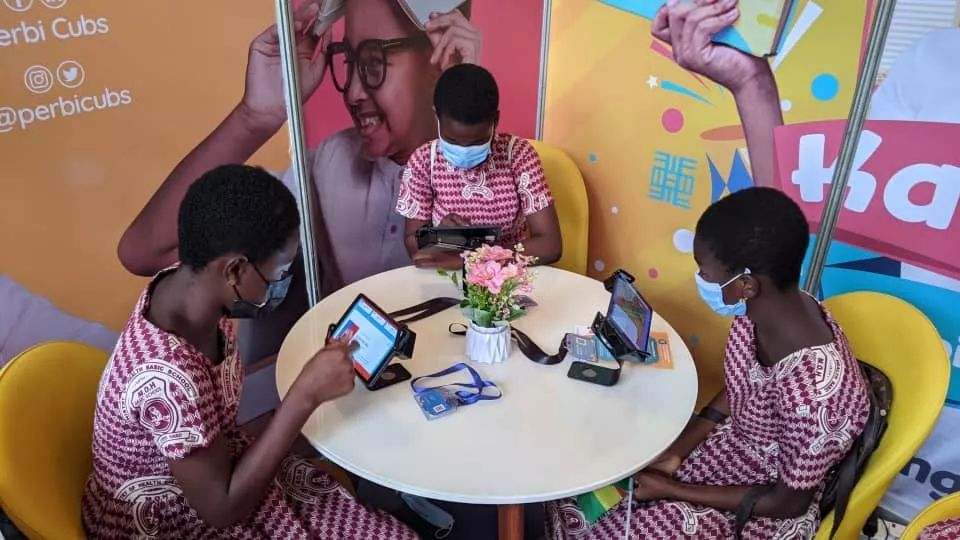
Perbi Cubs has served about 10,000 children so far and is set to scale that in this AWBC year to 100,000
WE HAVE A PROBLEM
Kanéval is fun about something serious. And Ghana in particular has a problem that isn’t funny. As a society we do not value reading enough. If research has proven that the love for reading is a stronger indicator of a child’s success in school and prosperity in life than even their parents’ socioeconomic status or level of education, then we should be worried that only 6% of Ghanaian children at classes two and three can read and understand what they read (UNESCO 2021). Meanwhile the World Book Capital Network (WBCN) acknowledges and reminds us of the power of books and reading as cornerstones to more inclusive, peaceful and sustainable societies. Thus as they rightly put it at Perbi Cubs, “Success is just a book away,” be it personal or national.
Let this be the year we all got dead serious about raising the tide (the general level of literacy) that lifts all the other boats, all sectors and subjects, including STEM. O that the confluence for influence between Kanéval by Perbi Cubs, influencers like those cited above and all other players in the UNESCO’s Accra World Book Capital 2023 space will do the trick. Let’s get on with this serious business, having fun along the way. Kanéval it is!
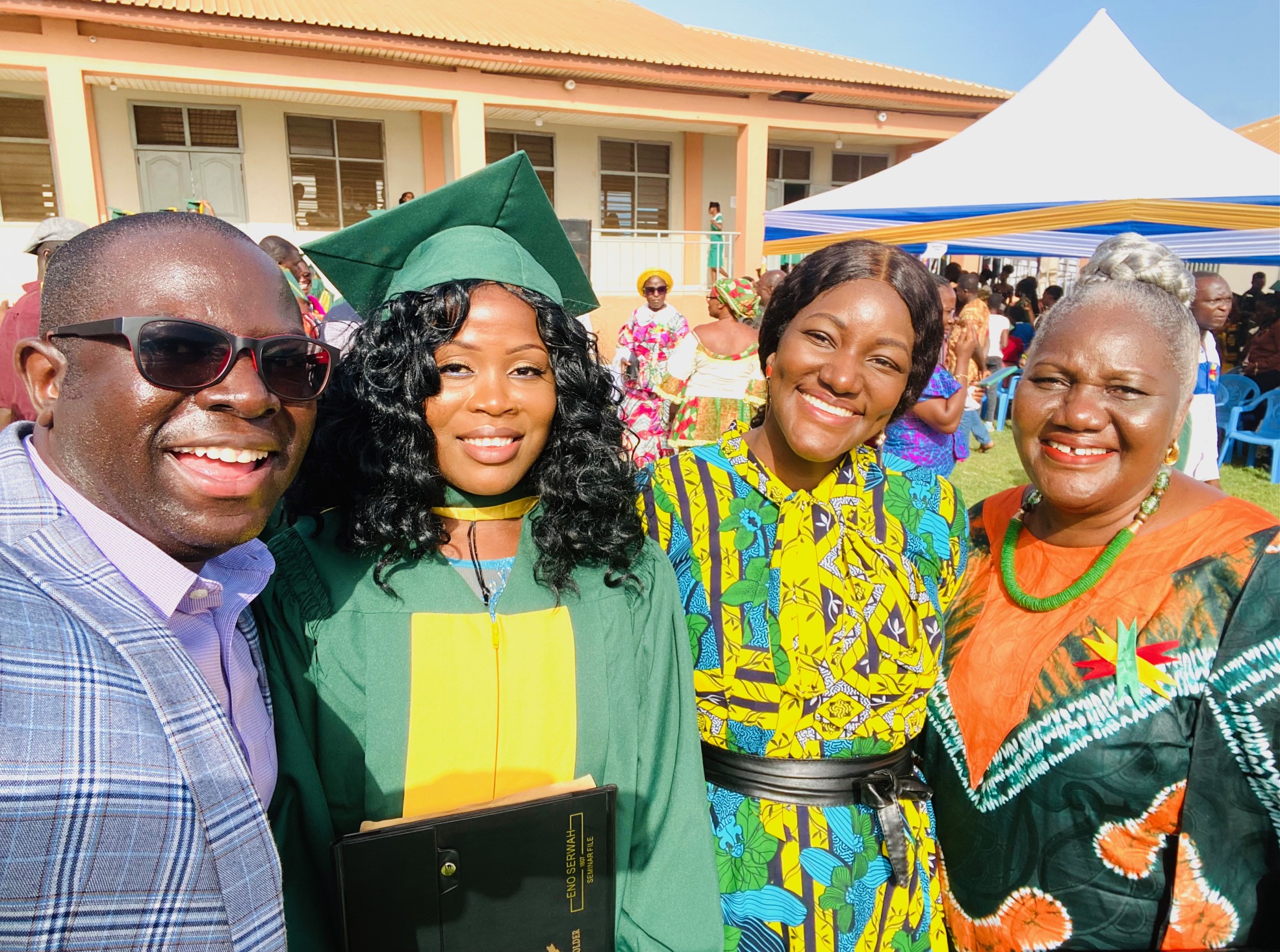
The Way Up is Down.
At Easter, I threw a challenge to the leaders in my network: lay down yourself for someone else’s uplifting. This challenge was triggered by inspiration I received when I had just returned from a college graduation the week before Holy Week. Although it had been a season of graduation ceremonies in Ghana across many tertiary institutions, this was a special one, a very special one.
About six years ago, our family travelled to Ghana from Canada on furlough. We had planned to stay the entire period at my parents-in-love’s residence in Accra. Being a reasonably big-sized big family (the children weren’t even seven yet!) we obviously needed some domestic assistance. We were glad to welcome a promising young lady, Benedicta, as our new house help after a couple of failed trials.
As we lived with her and observed her initiative, diligence, smartness, humility, kindness and care we took an extra interest in what her ultimate dream was. She had the potential to be like any one of us high income, high impact professionals and not necessarily having to be confined to a vocation of domestic assistance her entire life. We found out about her high school final grades and thought they could be improved. And so we (my wife and I, parents-in-love and other family members) decided to invest in her, everything from extra classes through re-sit examinations. Even when she was finally given a shot at college my mother-in-law would get her books and do mock interviews with her to prepare for the entrance interviews. Long story short, she made it into nursing college.Now, that is the graduation we went for that day.
Today, Benedicta is a nurse. She graduated from the Nurses & Midwives Training College in Teshie, Accra, Ghana. From house help to nurse; and that is what brought me to the Easter challenge because at Easter, we see the ultimate leader Himself laying down His life for the people He saw value in. At the risk of sounding holier-than-though, the previous family she left to serve ours was just about to invest in her to be a fried pork seller by the street.
JOHANNINE CHALLENGE
Everybody knows John 3:16: “For God so loved the world that He gave His one and only Son, that whoever believes in Him shall not perish but have eternal life.” But what a lot of people who are not schooled in Trinitarian theology don’t realize is that this scripture is basically saying that God so loved the world—God so saw value in you and me—that he gave Himself for us, because God is Father-Son-Spirit. The ultimate leader laid down Himself for our uplifting.
PAULINE CHALLENGE
This giving of Himself or laying down His life for us is spoken of by St. Paul’s to the Church in Philippi in such humble and humbling terms. He begins in Philippians 2:5 by exhorting that “your attitude should be the same as that of Christ Jesus.” Let’s take Eugene Peterson’s contemporary version:
5-8 Think of yourselves the way Christ Jesus thought of himself. He had equal status with God but didn’t think so much of himself that he had to cling to the advantages of that status no matter what. Not at all. When the time came, he set aside the privileges of deity and took on the status of a slave, became human! Having become human, he stayed human. It was an incredibly humbling process. He didn’t claim special privileges. Instead, he lived a selfless, obedient life and then died a selfless, obedient death—and the worst kind of death at that—a crucifixion.” [1]
Wow! God becoming a man was not just humbling, it was humiliating. Yet even when formed and found in appearance of a human, he could’ve been a very proud man but no! He was down-to-earth and mingled with tax collectors and ‘sinners’. In fact, it was on the night he was betrayed–during Holy Week–that He washed his own disciples’ dirty and stinky feet and wiped them with a towel around his waist.
The way up is down, for because of this humble attitude and action, “God lifted him high and honored him far beyond anyone or anything, ever, so that all created beings in heaven and on earth—even those long ago dead and buried—will bow in worship before this Jesus Christ, and call out in praise that he is the Master of all, to the glorious honor of God the Father.” [2] Even those who are not voluntarily honoring Jesus now will bow one day, compelled. All shall bow to the one who first bowed the lowest and is now raised the highest.
YOUR CHALLENGE
As a leader, I want to challenge you to choose one person, choose one thing to do this month (we’re still in the month of Easter) that involves laying down your preference, time, or money, sacrificing something, dying a little so that someone can live, graduate, have a better life etc. I challenge you to do that because that is the essence of ultimate leadership. Leadership is not about us, it is about those who take inspiration, follow, and learn from us who we get to empower and guide; those around us.
It’s sad to see so many places in the world, especially in Africa, where government official think it is all about them. Unfortunately, even in the church there are a myriad instances where pastors are doing extremely well socioeconomically and there are congregants who are not faring well, at all. Sometimes these leaders are literally fleecing the people, milking them dry till they bleed. That’s not leadership at all, and certainly not servant leadership. Leadership is laying down our lives, laying down our gifts so that others will be blessed. It is going down to pick the downtrodden and lifting them up.
Cecelia Chan poignantly put it this way: “Instead of laying a red carpet for yourself to walk on, lay a bridge and let the young people walk over to you.” This is my challenge to you, at Easter and beyond: lay down yourself for someone else’s uplifting. God bless and honour you too as you learn to lead like Jesus.
References
[1] Philippians 2:5-8, The Message
[2] Philippians 2:9-11, The Message
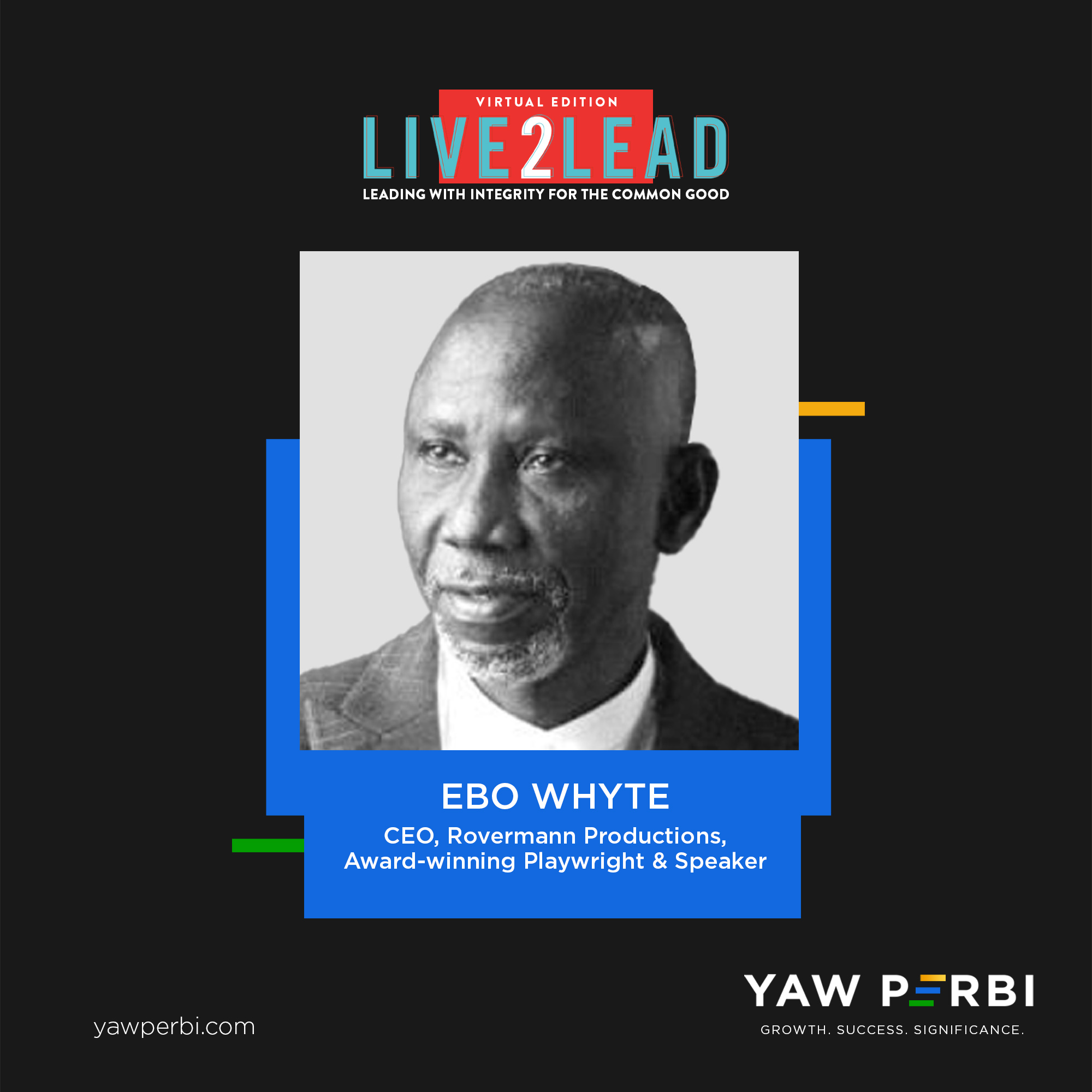
Meet Uncle Ebo, the People’s Uncle.
Everyone calls him “Uncle” without even thinking twice about it. Whether young enough to be their son or old enough to be their grandpa, “Uncle” is everyone’s uncle. A voice of reason, counsel in season, James Ebo Whyte, affectionately known nationwide as “Uncle Ebo” is the people’s uncle, hands down.
Mr. James Ebo Whyte is the CEO, heart and brain behind Roverman Productions. He is nationally acknowledged as an accomplished, award-winning playwright and highly sought-after motivational speaker. James Ebo Whyte constantly challenges Ghanaians to think more about the world they live in and the contribution they make to it. Just the day before the October 7, 2022 Live2Lead conference at which he was speaking, he unveiled to his drama troupe his 51st play in fourteen years! A hearty congratulations to the prolific playwright.
INTEGRITY IN THE ARTS & ENTERTAINMENT INDUSTRY
At Live2Lead 2022, Uncle Ebo was the only gentleman among three distinguished leading ladies from the corporate and entrepreneurship spaces as well as the public sector. Their first job was to respond to the submissions on “Leading with Integrity for the Common Good” made in the earlier hour by Patrick Awuah, founder and president of Ashesi University. Uncle Ebo held our attention as he raised issues of integrity in the arts & entertainment segment of Ghanaian society that he had with intentionality decided to counter, like giving kickbacks from corporate sponsorship. He uttered with conviction, “there are sponsorships we know we’ll never get for our plays because of this.” And he’s fine with it, as he knows that integrity comes at a cost.
One of the most amazing feats of Roverman Productions has been putting up a new play every quarter for the last decade-and-a-half and resolving to always start on time, also a matter of integrity. In fact, one of the participants at Live2Lead, a corporate governance expert, interjected that one reason she chooses to go and see Ebo Whyte’s plays is that she can guarantee they would commence on time. Again, Roverman has gone against the tide by ensuring pristine toilet facilities at their play venues and three levels of security at events to ensure patrons have a heavenly experience and leave with no bitter taste in their mouths. To the people’s uncle, excellence in these areas is a matter of integrity.
OF TEENAGE FOLLY AND GAMBLING
We intentionally wanted to leave the Live2Lead conferees on a note of hope, especially hope in Ghana, and Uncle Ebo did not disappoint. While admitting we have mega challenges in the nation he reminds us that we’ve not only been in worse times but also that in the annals of nation building globally, at 60 years Ghana is only a teenager. The national happenings that leave us in consternation are akin to teenage tantrums and this too shall pass. We do have quite a degree of national folly though, which we need to be cured of, he confesses.
Uncle Ebo’s belief in Ghana is so solid that his parting words were the following: “Whoever bets against Ghana will lose.” For a full buffet of this scintillating conversation look out for a recording of the hitherto livestreamed video (currently only available to paid participants) or invite Live2Lead to rebroadcast in your context (company, community, church etc). You don’t want to miss Live2Lead 2023 on October 6, next year, Deo volonte. Pinned on the first Friday of each October, National Leader Day after National Leader Day, building a leader at a time and one centre of excellence at a time, we shall surely get to the Ghana we want. And who knows? Perhaps sooner than other nations have.
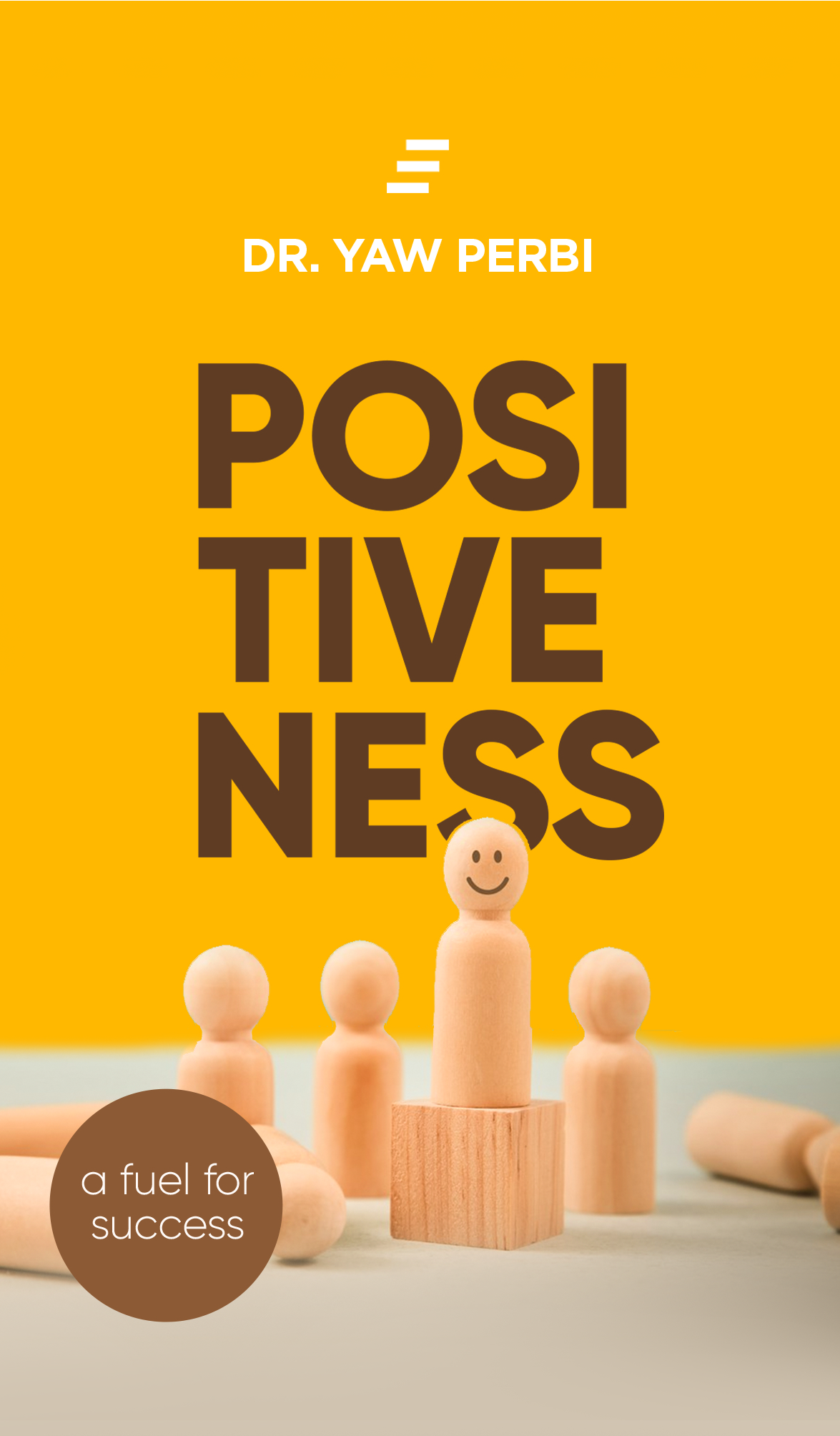
PANDEMIC OR NO PANDEMIC, POSITIVENESS IS STILL A FUEL FOR SUCCESS
The following is a snap peak of the preface to the third edition of Dr. Yaw Perbi’s third book, ‘Positiveness: a fuel for success’, first published in 2003 to commemorate his silver jubilee.
It took a global pandemic to make this third edition of Positiveness: A Fuel for Success, possible. I have been trying to republish this book for nearly a decade now. The revised manuscript was done in 2012, and I had nearly completed the back-and-forth with a publishing company. All was ready to go, or so I thought. Then life happened and I put this on the backburner. Until now. It took the lockdowns of the Coronavirus pandemic of 2020 to get this going again.
I have changed a lot since I turned 25 and first launched this book and so have many things too. We didn’t even have smartphones back then, and the internet was still a novelty. But some things have remained the same. After thousands of copies sold and many countries reached, “through all the changing scenes of life, in trouble and joy,” what hasn’t changed is the fact that positiveness is still fuel for success.
In the past two decades, I have lived and worked for a year or more in three countries on two continents. In doing so, I have needed a whole lot of positiveness, especially in those times when I was geographically separated from my family. I have formally had various occupations and preoccupations ranging from being a medical doctor in Ghana, a military captain with the United Nations in Cote d’Ivoire, a leadership consultant and speaker around the world, pastor of a Chinese congregation in the French city of Montreal, a financial security advisor and investment consultant, to being president of a couple of Canadian and global charities. Positiveness is still fuel for success no matter the field of endeavour.
You see, this book was only my third book and, back in 2003, I wrote and self-published it with a white cover and silver inscriptions to celebrate my twenty-fifth birthday (silver jubilee). At the time, I was a struggling medical student in Ghana attempting to do ‘what Napoleon couldn’t do’. I was trying to straddle the world of medicine and human development. In May 2003, together with a group of friends, while still in med school, I founded The HuD Group to inspire and empower young people to reach their full potential. Now I am a full-fledged medical doctor who has hung up his stethoscope— after four years of clinical practice—to focus on human development, especially holistic leadership development, because I sincerely believe, like my mentor John C. Maxwell, that “everything rises and falls on leadership.”
The HuD Group began in Ghana but, at the time of writing this, I am feverishly coordinating our global operations in two dozen countries on all continents of the world and currently domiciled in Montreal, Canada. If I thought I needed a daily prescription of positiveness back in 2003, then I might need a thrice daily prescription now. The two-year battle with the Canada Revenue Agency alone to get charitable status for The HuD Group warrants a book on its own. I’ll save that for another day, but it took positiveness to fuel my success.
When I was much younger and naïve, I dreamed of working with the United Nations. And unlike many for whom that is still a dream, I achieved it. I did that, for a year, in La Cote d’Ivoire. Even while already enjoying that success, I still needed positiveness as fuel when I got car-wrecked on July 21, 2008 and lost two of the military colleagues I was travelling with. It was positiveness that got me back on the road to recovery. My commanding officer, out of rare soldier-sympathy, wanted me to return home (to Accra, Ghana) and recuperate but cheers to positiveness, I was convinced to stay put and serve with grace. I prevailed. Positiveness prevailed.
So yes, life has changed—a whole lot— and so have I since 2003. Now married to my dear wife, Anyele, and a father to seven amazing children, I certainly have a broader and deeper perspective on life today. But if anything, these changes have only affirmed and confirmed the principles that were penned in this book nearly two decades ago. Positiveness is fuel for growth, success, and significance in any and every endeavour, and at whatever age and stage in life, that hasn’t changed.
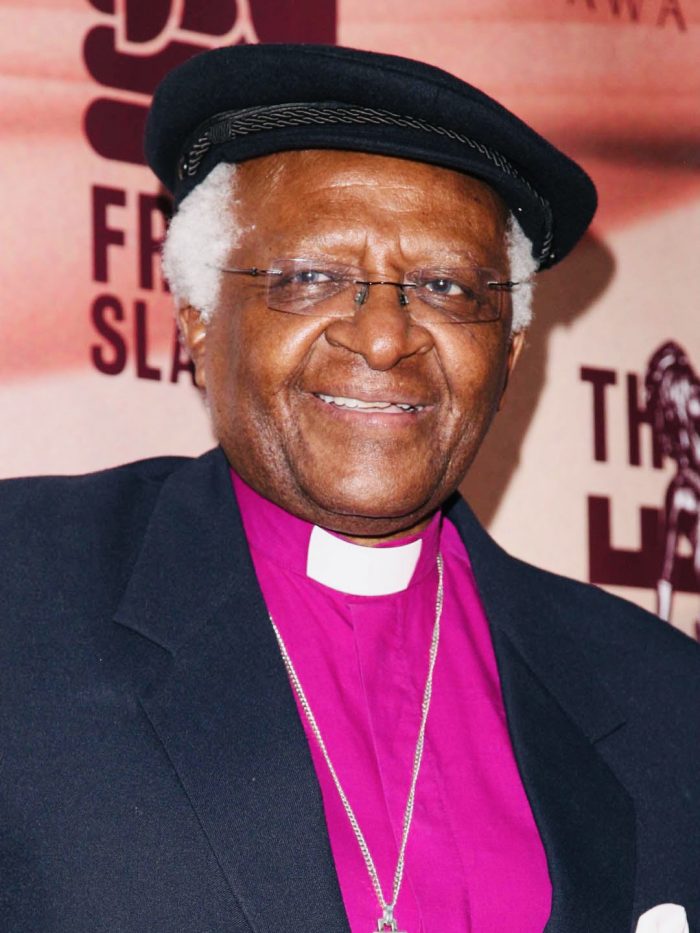
From One Legendary Leader in the Evening to Another One in the Morning–a Tribute to Archbishop Desmond Tutu

The beloved late Desmond Tutu (photo: Yaw Perbi does not own the rights to the picture and owner is unknown).
I was emailed this incredible tribute by a mentor of mine in the Lausanne Movement, Dr. Michael Cassidy, to his late friend Archbishop Desmond Tutu, that I just had to share as a student of leadership. What impresses you most? May many Cassidies and Tutus be raised in our generation!
Tribute to Archbishop Desmond Tutu
from
Michael Cassidy
Founder, African Enterprise
Honorary Chair, The Lausanne Movement
Archbishop Desmond Tutu, one of South Africa’s greatest ever luminaries, both ecclesiastical & national, has gone to be with His Lord. People from every race, sector & background will mourn his passing, because he was a man for all who stood without fear or favour for the human rights of all.
Perhaps it is as an almost unequalled African champion for human rights that he will be most fondly & universally remembered. And it was for this that he justly became a Nobel Laureate.
In South Africa his immensely courageous fight against Apartheid earned him the fearsome opprobrium of the National Party Government, the settled hostility of most whites, but the thankful adoration of all people of colour, as well as more liberal whites. In fact, from the church, his voice during those dread years, was by far the most audible, & his persona by far the most visible. This audibility & visibility constituted a true achievement of note & contributed powerfully to the final fall of Apartheid.
As far as we were concerned in African Enterprise, Desmond was a friend to our work & contributed powerfully to conferences we organized or helped organize such as SACLA (South African Christian Leadership Assembly), the NIR (National Initiative for Reconciliation), & The Rustenburg Conference which represented the whole church spectrum & spoke to the whole range of political leadership from far left to far right.
At a personal level I also counted Desmond a good friend. He commended numbers of my books, including my recent Memoirs, & wrote the Foreword to my book The Politics of Love. We also shared in significant ministry together in African Enterprise’s city-wide mission to Kigali, Rwanda, a year after the genocide. That was very moving. I especially remember ministering with him in terrifying cells of pitifully jammed together prisoners. And then being with him as he collapsed in tears in one church filled with skeletal remains of murdered victims. There I saw his profound compassion poured out. Even as we tried to hold him up. Such shared moments one can never forget, culminating in our sharing the evangelistic preaching to a packed stadium in our final service.
And all this Desmond could do in spite of the fact that we had strong theological differences on certain issues such as Universalism & Gay Marriage. But he never allowed those to damage our friendship. And neither did I.
Thankfully in our recently produced documentary, The Threatened Miracle of South Africa’s Democracy, Desmond features strongly, both during the Apartheid years, but even afterwards when he severely scolded the ANC of Zuma’s time saying, “I’m warning you; I’m WARNING you; you are a disgrace!” No one else had that truly prophetic courage, credibility & ability to speak to all sides, all the time, AND be heard!
Yes, we will miss him… “the Arch”, as he was affectionately known, even by the media. But his legacy of prophetic witness will live on wherever South Africa’s story is told, & wherever racial justice & the Human Rights struggle are in purview.
To his dear, always supportive wife Leah, to his family, to his ministry colleagues, especially in the Anglican Church, we in African Enterprise world-wide extend our deepest sympathies, & assurances of heart-felt prayers at this time.
Dear Desmond — Beloved Arch — thank you for blessing us with your life. Au revoir. We will see you in the Morning.
Michael Cassidy
Founder of African Enterprise
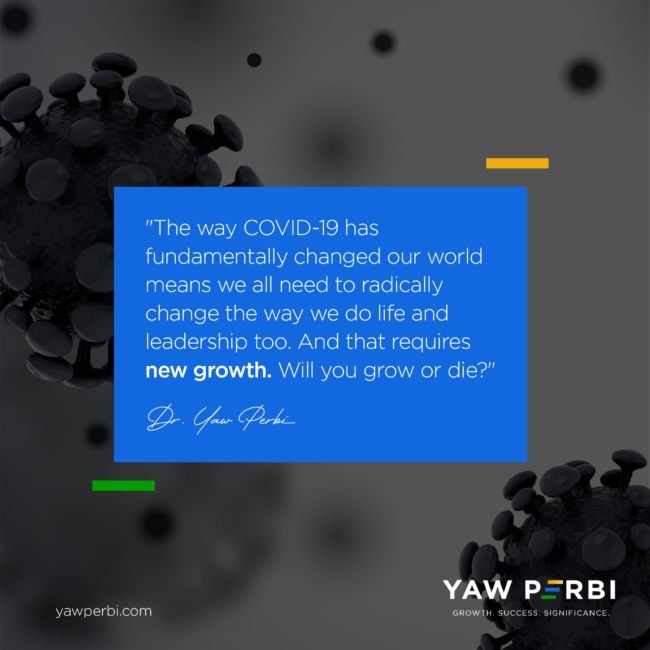
Festival of Nine Lessons & Corona
“The novel coronavirus is not just something for leaders to ”get through” for a few days or weeks. Instead, we need to treat Covid-19 as an economic and cultural blizzard, winter, and beginning of a “little ice age”—a once-in-a-lifetime change that is likely to affect our lives and organizations for years,” says Andy Crouch et al. I concur.
Just before Christmas 2020 my lawyer-banker friend and fellow John Maxwell Certified Trainer/Coach, Samuel Anim Esq., asked that I join him do an autopsy of the pandemic year 2020 live on Facebook/Youtube to draw leadership lessons. I was honoured and humbled. Honoured because it is a privilege to offer thought leadership and there is a myriad of leadership experts to choose from. I was humbled because not only do I not know all the lessons from Covid-19, I am still evaluating and learning from what I would perhaps call “the strangest year of my life.”
Nevertheless I managed to throw a few of my reflections together and gave it a funny title. Since around that time of the year there is the traditional Festival of Nine Lessons & Carols I thought of making this a Festival of Nine Lessons & Corona. Certainly there are more than nine leadership lessons from this Coronavirus pandemic year but here are some:
1. EMBRACE PARADOX
Perhaps no one and nothing captures the paradox of 2020 like Charles Dickens and his classic phrase, “It was the best of times, it was the worst of times” (from A Tale of Two Cities). This same 2020 year, over 1.67 million have died and 42.6 million have recovered. You may have lost someone to COVID-19 but you are alive. I’ve been stuck at home but I’ve had the longest unbroken quality bonding time with my family ever! We lost our family’s physical library services business but gained online business five times the physical capacity. Whole old industries, like aviation, have been decimated but whole new industries have emerged and are booming like Zoom. 2020 has been catastrophic yet catalytic.
Welcome to leadership. Embrace paradox. Think of the paradox of a servant leader, as a prime example of leadership paradox. True leadership is almost always straddling two seemingly opposing worlds, something Bob Fryling describes as “the leadership ellipse” because an ellipse “is defined by two distinctly different focal points that are of equal importance. One point is not inferior to the other, and both are needed if there is to be an ellipse.” I previously blogged about this in more detail here.
“It was the best of times, it was the worst of times, it was the age of wisdom, it was the age of foolishness, it was the epoch of belief, it was the epoch of incredulity, it was the season of light, it was the season of darkness, it was the spring of hope, it was the winter of despair.” ― Charles Dickens, ‘A Tale of Two Cities’
If leadership has always been about managing the tension of tasks or people, money or mission, the present or the future, inner spiritual longings and the outward needs of the group we lead, being and doing, community and cause, truth-telling and putting the right spin on things, to live in the world without being of the world, to be faithful or fruitful etc. then all of these have been put on steroids in a para and post-Covid world.
I have said before and I repeat: “the degree to which one is able to be comfortable with and live, love and lead well in the tension of this and that, yin and yang, determines their ultimate leadership success or otherwise. From my little experience and research, the best leaders in the world are those who are not only able to get comfortable with being uncomfortable living in such tensions but mastered the art of dextrously handling both well.” The post-Covid world leaves us no choice. Embrace paradox or die.
2. MAINTAIN THE MISSION, MUTATE THE MEANS
You and yours don’t want to end up like the Choluteca Bridge in Honduras. It was initially built in 1930 and reconstructed in 1996 to withstand tough weather conditions, including hurricanes. Well, two years later, in 1998, the bridge did prove its mettle, withstanding the category five storm, Hurricane Mitch, that devastated Honduras. Buildings were destroyed and roads wiped out but the bridge survived in near perfect condition. The only problem was that there were no roads for it to connect to anymore (roads wiped out at both ends) and the strong winds of the hurricane had caused the river to carve out an entirely new path that no longer ran under the bridge!
Think about it: a bridge connecting to nowhere and no one; and over nothing! If a bridge is no longer a way or a means to a desired end, then what is it? Similarly, if your pre-Covid means are no longer effective post-Covid as ways to deliver your mission, then of what use are they?
You certainly don’t want to lose sight of your vision or your grip on your mission but when it comes to your strategies, your ways and means to accomplish your mission, you don’t ever want to be dogmatic about that. In matters of mission, be as solid as a rock; but regarding the means flow like a river.
THE OTHER SEVEN LESSONS
3. Global community is the real deal context of leadership
4. Capitalize on era of Business without Borders
5. Heed the Harm to our House (Earth)
6. Inequities, Inequalities, Integrity-lessness will be exposed with time
7. Reflective lifestyle is the must-have rhythm of leadership
8. Become and raise agile “VUCA Prime” Leaders (VUCA is an acronym for Volatile Uncertain Complex Ambiguous)
9. HOPE is the real vaccine.
For further details of each lesson, watch the full video here.
CONCLUSION
If there is any one of these nine Covid-19 life and leadership lessons you need to grow in for a more successful 2021 you’re in good company. Join me. Come to the growth table. Join the 15 Invaluable Laws of Growth January journey in the form of a mastermind group of just 15 high level executives. Register right now here. The way COVID-19 has fundamentally changed our world means we all need to radically change the way we do life and leadership too. And that requires new growth. Will you grow or die?
Post Script
Earlier in the last quarter of the year I shared my faith-based Covid-19 reflections vis-a-vis Christian mission with pastors and church leaders here.
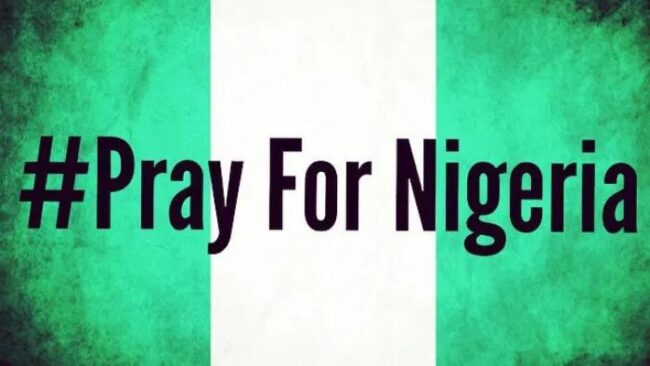
Nigeria is Too Important to Fail

Leaders and organizers of the Africa Impact Forum in February 2020 (Photo credit: Africa Leadership Initiative)
What a year for Black folk! From police brutality in the United States of America (USA) to same in the western region of Africa, White on Black, Black on Black, what a year! One would think that having commemorated 2019 as 400 years after the first Black slaves set foot in what is now the USA the news wouldn’t smell of Black beatings and lynchings and treatment as less than human any longer but here we are. In this season we’ve had the luxury of both time (thanks to COVID-19) and technology to etch these news clips into our consciences and reveal to us not only where we stand but even more deeply, who we are.
On the last day of this year’s Africa Impact Forum (February 26-29) for fellows of the Africa Leadership Initiative, a part of the Aspen Global Leaders Network, my heart was really stirred by Olara Ottunu, Ugandan diplomat, lawyer and politician. He was Uganda’s Permanent Representative to the United Nations from 1980 to 1985 and was the United Nations Under-Secretary-General and Special Representative for Children and Armed Conflict from 1997 to 2005. Olara Ottunu minced no words in the final plenary that there can be no African prosperity without Nigeria and the Democratic Republic of Congo doing well. These ‘big boys’ are the most populous Anglophone and Francophone nations on the 55-state continent of Africa. I have since not looked at Nigeria the same way. Nigeria is too important to fail.
If Black Lives Matter, then the most populous Black country on earth matters immensely. Altogether the over 200 million Nigerian people of 300 tribes matter; individually, each person matters. And by the way, Nigeria will overtake the United States to become the third-most populous country in the world by 2050, surpassing the 300 million people mark, according to a United Nations report. The current seventh most populous country in the world is not only rich in people but also oil and other natural resources. This goes without saying.
Boasting of one of the most vast African Diaspora populations in the world, I have personally had the pleasure of forging deep friendships with Nigerians at medical school in Ghana and as president of International Students Ministries Canada today, delight to see them shine among the top 10 sending countries of international students to Canada. If Africa is the most numerically Christian continent in the world today, it is significantly in part due to Nigeria’s over 90 million strong Christian population.
When Africa’s largest market of 200 million people (twice the size of Ethiopia’s 110 million or Egypt’s 102 million) surpassed South Africa to become the continent’s largest economy as well last year, the business experts had to admit, “Now It’s Too Big for Businesses to Ignore.” Why do you think the United States and United Kingdom have over $55 billion in foreign direct investments in Nigeria, with the Chinese following close after France? Not to mention Italy, India, South Africa, Singapore and Switzerland.
NIGERIA IS WORTH SAVING
When George Floyd was slowly slaughtered before the eyes of a watching world and protests erupted all over the United States and around the world, one of the most profound things I heard was that if Africa had upped her socio-economic game many African-Americans would’ve rather returned ‘home’ than suffer such indignity in the U.S. Even then for some, freedom and dignity matter more than economics, so have responded to overtures from governments like Ghana’s to ‘come home.’ “We want to remind our kin over there that there is a place you can escape to,” said Akwasi Agyeman, chief executive of the Ghana Tourism Authority. “That is Africa.” Now, if I may ask, what is the sense in Blacks escaping police brutality in America, crossing the expansive Atlantic, only to come ‘home’ to the same police brutality, Black on Black?
I am very proud of the display of Youth Power! that has called for #EndSARS and indeed has succeeded in the dissolution (on 11th October, 2020) of the Special Anti-Robbery Squad (SARS) of the Nigeria police which has meted out unspeakable crimes against the citizens of Nigeria. Now some protests are deteriorating into rioting while law enforcement is metamorphosing into death squads firing live ammunition into crowds. As Global CEO of The HuD Group, with HuD Nigeria as one of our strong networks, we demand that elected officials as well as the teeming youth be response-able (responsible) and remember that they hold the dignity and prosperity of the entire Black race in their hands.
All nations matter but not all nations are equally strategic. You would think some of the reasons given above why Nigeria is too important to fail are rather carnal but once upon a time when God Himself wanted to save a certain nation from destruction His reason for sending them a prophet to save them from themselves was pretty intriguing: “And should not I pity Nineveh, that great city, in which there are more than 120,000 persons who do not know their right hand from their left, and also much cattle?” (Jonah 4:11) The numbers of humans matter, the natural resources matter. Nigeria is too big and too important to fail. #PRAY FOR NIGERIA!

